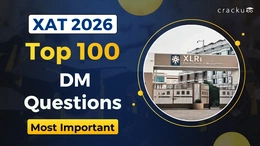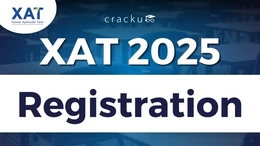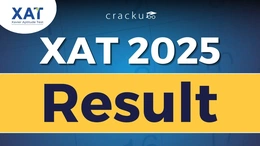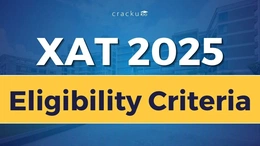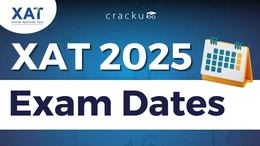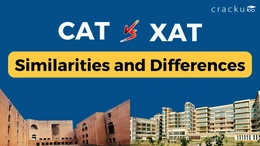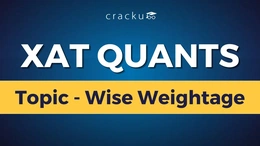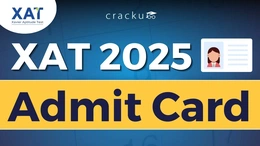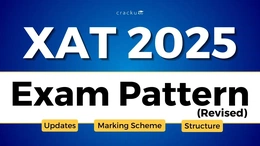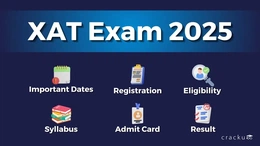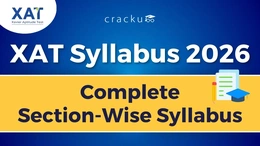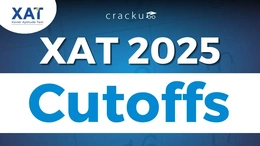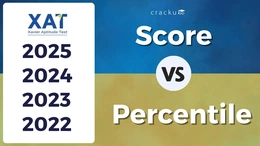XAT Decision Making Syllabus 2026: The XAT 2026 Decision Making syllabus focuses on testing candidates' ability to handle real-life situations and make sound, ethical decisions. It includes questions based on business scenarios, ethical dilemmas, human resource issues, and social/personal situations. Key areas covered are risk assessment, cost-benefit analysis, data interpretation, and situational judgment.
This section assesses critical thinking, problem-solving, ethical reasoning, and time management. Since it’s case-based, there's no fixed syllabus, but practicing real-world scenarios and analyzing diverse situations are essential for success. This section is unique to XAT and emphasizes practical judgment over theoretical knowledge. To ace this section of XAT Syllabus students need to practice a lot of XAT decision making questions. Here we have provided a detailed XAT DM Syllabus for the Candidates.
XAT Decision Making Syllabus 2026
The Decision Making syllabus for XAT exam is designed to test a candidate's ability to analyze complex real-life situations, often involving ethical dilemmas, business or managerial problems, and personal scenarios.
While there is no formal syllabus, the following key areas and topics are typically covered in the Decision Making section based on XAT exam analysis:
Organizational Behaviour:
- Case studies or scenarios where candidates must make decisions based on business operations, marketing strategies, finance, or managerial choices.
- Examples may include optimizing resources, resolving conflicts, improving business efficiency, and dealing with internal or external business pressures.
Human Resource Management (HRM) Situations:
- Focuses on interpersonal issues such as conflict resolution, team dynamics, performance evaluation, employee motivation, hiring, or firing decisions.
- These questions often test emotional intelligence, leadership skills, and the ability to balance fairness with organizational goals.
Ethical Dilemmas:
- Ethical decision-making questions where candidates are required to choose between competing moral values.
- Scenarios could involve issues like corporate responsibility, environmental concerns, or balancing profitability with ethical concerns.
Social and Personal Situations:
- Scenarios where personal values, social norms, or societal expectations are tested.
- These questions focus on personal judgment and balancing self-interest with the greater good.
XAT Decision Making Important Topics 2026
Below we have provided some of the important topics for the XAT Decision Making section.
Data Interpretation & Analytical Reasoning:
- Some questions involve numerical or graphical data that needs to be interpreted and analyzed to make informed decisions.
- Topics like profit and loss, market share, sales data, or resource allocation might be involved.
Risk Management & Risk Evaluation:
- Candidates are expected to assess the risks associated with a decision and evaluate the potential outcomes.
- This includes recognizing uncertainties and understanding the potential impact of decisions.
Cost-Benefit Analysis:
- A common decision-making tool where candidates must weigh the advantages and disadvantages of multiple options.
- This includes assessing both short-term and long-term consequences of a decision.
Behavioral and Managerial Judgment:
- Scenarios that assess how candidates deal with people and organizational problems, such as leadership challenges, handling underperformance, or motivating employees.
- Questions may involve managing teams, dealing with difficult colleagues, or handling sensitive workplace issues.
Ethical Reasoning & Social Responsibility:
- Involves making decisions that align with ethical principles, integrity, and social responsibility.
- Candidates need to assess what the "right" thing to do is, balancing professional responsibilities with broader societal concerns.
Logical Reasoning & Problem Solving:
- Decision-making problems often include logical reasoning elements, where candidates must evaluate different outcomes logically.
- This includes understanding relationships between variables, identifying contradictions, or deriving conclusions from complex information.
How to Prepare for XAT Decision Making Syllabus 2026
Preparing for the XAT Decision Making syllabus requires a strategic approach since it is a unique section that tests candidates on their ability to handle real-life scenarios, ethical dilemmas, and business-related decisions. Here’s a detailed guide on how to effectively prepare for this section:
Understand the Nature of Decision-Making Questions
- The Decision Making section is designed to evaluate your problem-solving ability in a wide range of scenarios, including business, ethical, social, and human resource management situations.
- The key to solving these questions is logical reasoning, ethical judgment, and managerial statics. Your decisions need to be both practical and ethically sound.
Analyze Previous Years' Papers
- Go through past XAT previous year papers (at least the last 5 years) to get a clear idea of the type of questions asked in this section.
- Focus on identifying patterns in the questions, such as recurring themes or decision-making models.
- Analyze how the questions are framed and what kinds of dilemmas are presented (ethical, financial, HR, etc.).
Tip: Prioritize solving past year papers under timed conditions to get familiar with the pace required during the exam.
Work on Case-Based Decision Making
- Most questions are based on real-life or case-based scenarios where candidates are asked to choose the best course of action from multiple options.
- Practice reading and understanding case studies in business management, human resources, and ethics.
- Understand the core problem in each case, weigh different options, and evaluate their outcomes logically before making a decision.
- Practice with sample case studies found in business school materials or corporate strategy casebooks to refine your analytical thinking.
Improve Ethical Decision-Making Skills
- The Decision Making section tests not only logic but also ethical judgment. Many scenarios will involve moral dilemmas where you’ll need to choose the right course of action based on fairness, integrity, and responsibility.
- Study concepts of business ethics, corporate social responsibility, and organizational integrity.
- Read real-life ethical dilemmas faced by companies, and analyze how they resolved these issues.
Tip: Practice resolving hypothetical ethical dilemmas and evaluating what makes a decision morally sound yet practical.
Enhance Problem-Solving Skills
- Develop your problem-solving approach by breaking down complex scenarios into smaller parts and tackling them step by step.
- Try to identify the primary objective of the problem, the constraints, and the potential outcomes of different decisions.
- Use logical reasoning to eliminate choices that are extreme, unethical, or impractical, and focus on balanced solutions.
Conclusion
We have provided the detailed XAT Decision Making Syllabus 2026, covering the key areas such as business and corporate scenarios, human resource management, ethical dilemmas, risk management, and data interpretation.
These topics are designed to test your critical thinking, ethical judgment, and problem-solving abilities. While the section may seem challenging, just don’t worry! Focus on understanding real-life case studies, practice regularly, and improve your decision-making skills. Prepare your best with confidence, and you’ll be well-equipped to handle this section successfully. Remember, it’s all about applying logic and ethics to arrive at the right decisions.













